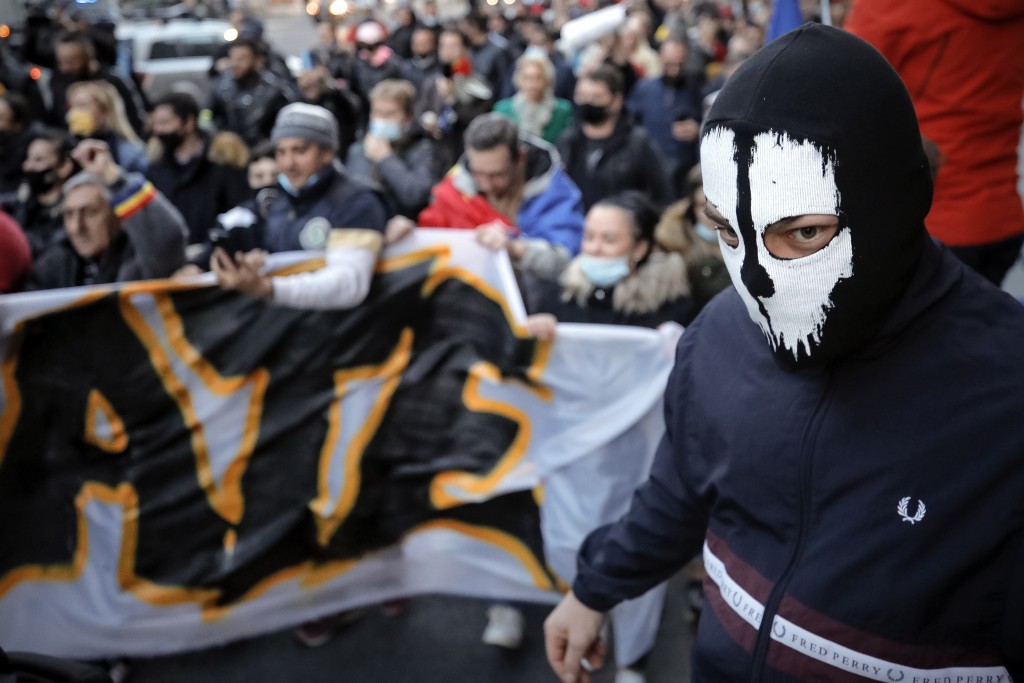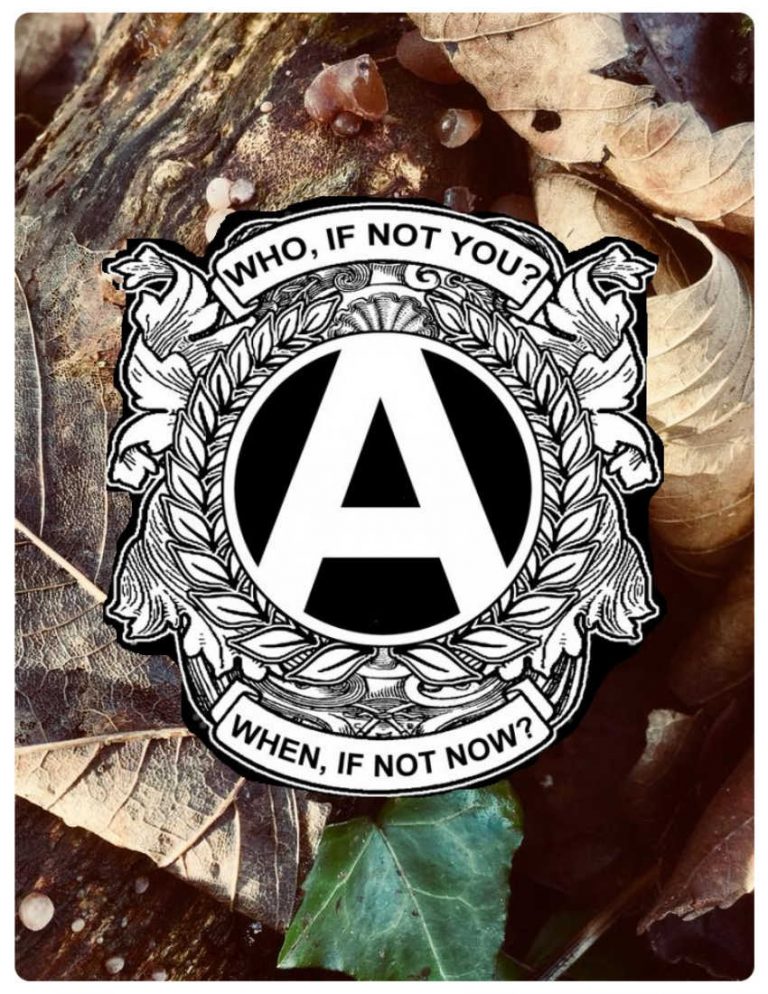From Dutch Anarchist Journal Rumoer
Corona and the fear of the unknown
At the beginning, nobody had any clue what corona was going to be. It was (and is) scary that there is something that can cause people to get sick and die that seems to hit so randomly and spread so easily. It is unclear who will get infected and how bad it will be, since the spectrum of symptoms and effect is extremely wide. Nonetheless, there is a clear image of the worst, of permanent health damage or death, and although this is the case with many illnesses and other circumstances the world over, this one has hit certain populations in a way that gives it a greater amplitude than many other viruses or causes of ill health.
In a situation like this, it seems logical to want to find some certainty, somewhere to find the answers, someo-
ne who knows what to do, something that will save you. And even though it is common knowledge that the state has always used crisis situations to expand its power, repressive means, and authority, we saw in our surroundings a lot of people turning to some authority in their search for safety and reassurance, or even just for a perspective on how to deal with the daily reality.
Staying true to yourself and to your surroundings
As an anarchist, or in anarchist spaces and surroundings, I presume a deep rooted hate and distrust to the state. I
see how despite this, I still participate in their world. I use their money, I use their health and educational system, their power supply, roads, and infrastructures, etc. It might be idealistic to say I want to participate in their world as little as possible, but I do want that, and in my search to a free(er) life, it seems a huge fucking step back to now see the state as offering solutions.
In my supposedly anti-authoritarian surroundings, a critical outlook on the state was pretty hard to find in the first period of the corona crisis. The measures and rules were easily accepted, and when there was critique from some people, it was about the state not responding harshly enough to the crisis.
The media made their spectacle. The measures seemed pretty random. Every country had their own take on things, claiming to have the actual truth and knowing how to handle it. Since both the measures and their results differed everywhere, it is clear that no one had the actual truth. Little was known about the virus, and new “evidence” disputed old “facts”. States did whatever suited them, more likely founded to some (small) extent on what they believed would best keep society productive and keep everyone in their position.
For me, three important values in my life are autonomy, solidarity, and thinking for myself. All of these were recuperated by the state. Life was restricted: rules were imposed on where and when you can go out, who you can see, and under what circumstances. They imposed a fake solidarity fitting their rhetoric. They came up with
1:1 comparisons on things that just are not 1:1 comparable. If you go out, your grandmother doesn’t directly die. And, with their fear campaign, they tried to force obedience and stop us from thinking for ourselves.
Responsibility and safety
I don’t want anyone to decide for me. I can take care of my own business, and I do what I do because I want to
do it, and therefore I have my responsibility in my life. But I also don’t want to make anyone sick, because I don’t want to harm others. I don’t want my choices to have a negative impact on others, at least for the most part.
The current crisis- a health crisis- is very personal. Our own bodies and the bodies of our loved ones are at risk. Though they have been for centuries by wars, exploitation, and other misery that comes with the logic of the state and capital, this danger was somewhat less expected, especially as we have constructed the world around us for our unique and ultimate benefit and protection, and have grown quite distant from our own fragility and mortality, at least for some of us. Since the virus is spread by people, by our own bodies, the actions of individuals are a potential risk for others or themselves. And for some people, it is very, very bad to take this risk.
But is bodily safety in this crisis the ultimate goal? Is health the new “security” – we accept having no life because we’re concerned with maintaining health above all. The state made people victims and wrongdoers. Above this, everybody was made into a parasite. Every contact a risk of contamination. People represent a dan-ger, every contact is a possible attack on your health and the only cure is to further alienate oneself from unmediated social life.
Still, one could easily argue that a big part of the world population faces bigger risks every day in their working and living conditions than we have in the last months in the European privileged position. And despite relatively easy means to limit the spread of other viruses or harmful circumstances (like malaria, hunger, homelessness) we accept that many people will suffer and die from these things because the solutions would cause disruptions and inconvenience to the rich and powerful.
Even when we presume the measures imposed by the state create a safer situation, I think there is more to life that is just as important, or even more so, than this ultimate safety. People are being avoided for their own safety. Not touched for their own safety. Without autonomy over their own life, justified by safety.
But what the fuck is safety? Have I been feeling safe under this system? Is the world safe under the current power structures? Do the morals of people around us make us more safe? Or just more controlled?
The loss of the ability to truly talk
In our social circles, I find myself in a net closing in on me: namely one of social control when dealing with the
virus. A lot of people somehow lost open communication. Instead of looking for solutions to our needs through talking and listening to those around us, many people adopted the measures of the state as a (strict) guideline for our behavior. Besides this, they also feel the need to impose this on others. They pressure me, doubt me, demand me to do … not necessarily what makes sense for us in a given situation, but to obey arbitrary rules.
Is it fear that makes it impossible to talk with each other and come to a direct consensus (with of course the possibility of disagreement or conflict) that fits both everyone involved and our own common sense? Can we make decisions on how to handle this, simultaneously respecting our own and other peoples wishes, without judging or freaking out?
Science and the riots
It seems the only analysis taken seriously is from scientists. For some reason, science is always very important for leftists and sometimes anarchists, but we need to see how it is not neutral, and very much used by the state. Science is not always bad, but it is being used, and done with interest to big money and powerplay. It is important to take health and science into account as factors in our analysis, yet they are not neutral or some higher truth, even though the state and social control nets claim it as such.
Also, it is very telling how the state now tells us that it is important to listen to all these very important scientists,
but only does so when it suits its own interests and not when it is inconvenient, for instance on climate or social
studies.
A huge part of the media circus around the corona/curfew demonstrations and riots was the image of people
not taking their responsibility in this public health crisis,and that rioting (in a group) puts others’ health at risk.
It is shocking that this is also repeated by some people from our circles, with some people even justifying the police actions, dismissing the riots as people showing off, being irresponsible, and putting other people in danger, dismissing the rioters as corona-gekkies who do not understand how serious this pandemic is and therefore do not have any right to express discontent. Many people in our surroundings fully adopted the state’s talk of responsibility, and even took up the cops’ roles at demos by enforcing the state’s protocols on other demonstrators.

A lot of what these “corona-weirdos” are saying is very valid (about control, state oppression, etc), but as soon
as there is a right wing smell to it, left and radical circles can only dismiss it, and any engagement with what is
actually happening around us disappears. While it is absolutely clear that yes, the extreme right in the form of nazis and Pegida (and many things in between) were involved in the demos and riots (and we should confront them and shut them down in every place and moment), it is just as clear that they were a very small part of the people on the streets…
At the same time as refusing any participation in demos and riots because of a (very) few right-wing elements, many from our surrounding found it totally acceptable to attend demos where left wing political parties made speeches and waved their flags. Why is it that we find ourselves at home in the thick of party politics and reformism but won’t even consider engaging with self-organized, autonomous people fighting the police and refusing authoritarian measures?
On to the next ‘crisis’
The ability of states and capital to recuperate and restructure, and even to create crises to serve their own interests is nothing new – think of the climate crisis, the refugee crisis, the oil crisis, and we should not have to make an exhaustive list of the ways in which the state, capital, and other forms of power (think technology! think science!) have manipulated this crisis to serve their interests, ones that are firmly rooted in logics of capital and exploitation that we want no part of.How can we imagine to give life to the anarchist ideas we hold dear – our beautiful idea, our love of freedom, our desire for of self-directed, self-chosen lives free from authority, power, and coercion – especially in the times we are living in now, when what we see around us is the expansion of control into all aspects of life?We cannot chart a course forward, against this virus or the next ‘crisis’ that awaits, without being able to reflect and propose on our own bases, from our own perspectives against a world full of authority and domination. We need to be able to distinguish between the proposals that bring us forward in our struggles and those that confine, enclose, and reduce (even further) our freedom and our imaginations of what is possible, that reinforce this techno-nightmare in our own heads and hearts, not to mention in our daily realities.
Let’s stay open and honest in discussion with ourselves and each other on how we actually want to live, and how we can deal with the current conditions, relying on our own ideas as a point of departure. As we hold them
so dear, they should be solid enough to hold up under a little pressure.
